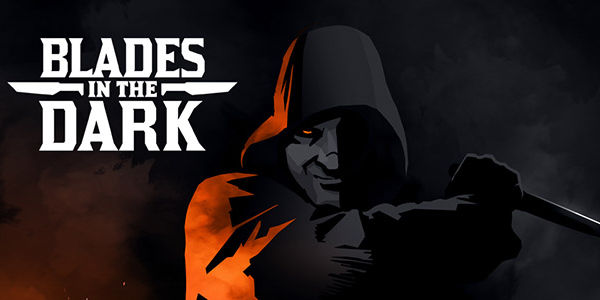Cults in the Dark

When I first heard about Blades in the Dark, it sounded really interesting, though I was put off by the actual mechanics, which were a lot more story driven than what I’m used to (and prefer). But I’ve finally decided to give the game a chance, and Friday night was our first session of creating characters and a crew on Roll20. We did try briefly to get the video and voice chat working in Roll20, but as usual it turned out to be flaky, so we’re using Hangouts for that, which is working fine.
In some ways, Blades in the Dark has similarities to Ars Magica (one of my all time favourite game systems), in that the organisation the PCs belong to is as much a character as the PCs are themselves, and there is a gang of NPCs that can be bossed around and used for generic grunt work. In Ars Magica this is your covenant. In Blades in the Dark, it is your Crew.
I started the background conversation about what the Crew were going to be a few weeks ago, making use of the Roll20 campaign forum for the group to flesh out what they were and what they wanted to do. The players decided that they were a cult of a Forgotten God – Ammoria the Watcher Who Sees All – who seek to obtain items of knowledge and offer them up to their goddess in sacrifice. Which gives them a good reason for going out and acquiring items that didn’t belong to them.
Doing this before hand saved a lot of time, and also gave me a chance to come up with enough of a starting scenario so if we actually had time to start something, I’d have something prepared.
For the start of the first session, I gave a quick overview of the rules and the setting again, and we had a discussion about what happened to people’s spirits when the died. This was where I did something I’ve very rarely done before – when I got a question about the background I didn’t have an answer for, I asked the group for their views on it. From this it was decided that though the bodies of the recently deceased were destroyed for the commoners, for the rich nobility this wasn’t necessarily the case. Exactly what happens to the bodies and ghosts of the richest families in society isn’t entirely known, but there are rumours that they are preserved in some way.
The result of character generation is that we have a Whisper, a Cutter, a Leech, a Lurk and a Spider, which gives a good spread of abilities. Character generation went smoothly, and everyone was happy to work with each other to ensure that everyone got to play something they wanted without stepping on each other’s toes.
Next up was where their lair was located, and it was decided that they have a lair in an old abandoned church somewhere in the Six Towers district, which is itself full of abandoned and decrepit buildings. The area they call home is run by the Circle of Flame – a refined secret society of antiquarians and scholars which is really just a cover for extortion, graft, vice and murder. This should compliment the gang well, but also lead to conflict since the Circle is probably more interested in collecting than destroying knowledge.
They are also friendly with Lord Scurlock, and at odds with a cult of another Forgotten God, which I’ve decided will be “The Shrouded Queen“, since that’s a cult I’ve got some ideas for to be a medium term rival for them anyway.
They spent one of their starting Coin to keep in the good graces of the Circle of Flame, and the other one to be really friendly with Lord Scurlock, which leaves them with nothing to start with. They better hope they gain something from their first score.
The recommended starting hook is that the crew are stuck between two much stronger opposing factions and being forced to chose which side to back. Instead, I decided to have them just starting out, and having to exert their influence against another faction which is more on par with them to keep ownership of their starting turf. It becomes more of a story about them flexing their muscles and strengthening their position rather than simply doing the bidding of someone else. There will be plenty of opportunity (and need) for that later.
With everything more or less fleshed out for their characters and crew background, we decided to end things there. This gives me a lot of opportunity to read up on the bits of the rules I’ve realised I don’t quite get, and try to understand how the first score needs to be run.
Blades has some very specific rules on how adventures are run. This is unlike anything I’ve run (or played) before, which have been very open ended. It feels a bit railroaded to me, but I’ll see how things go and hopefully it’ll turn out to just work. More on that though next week.